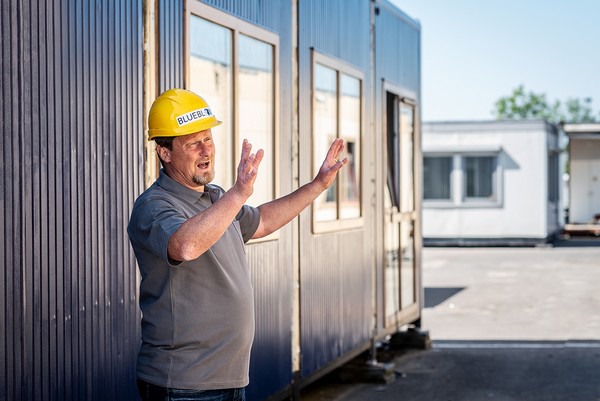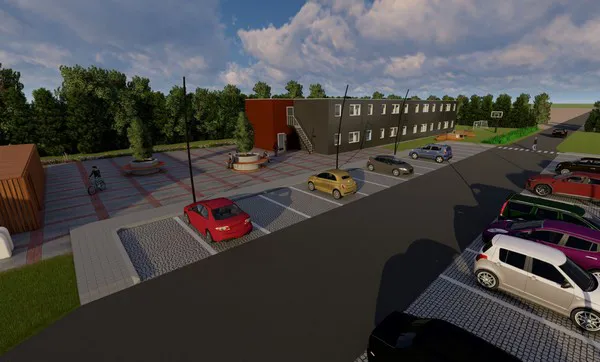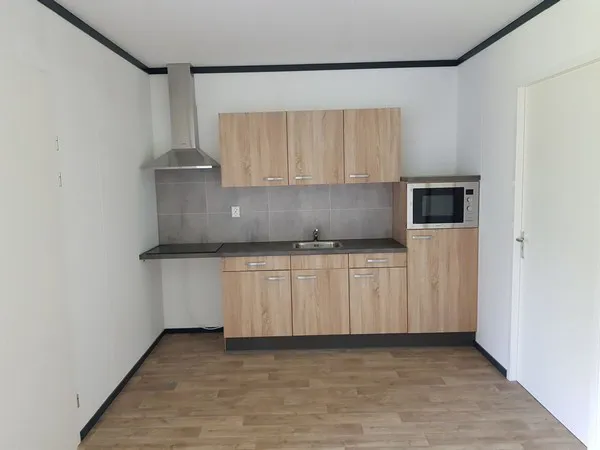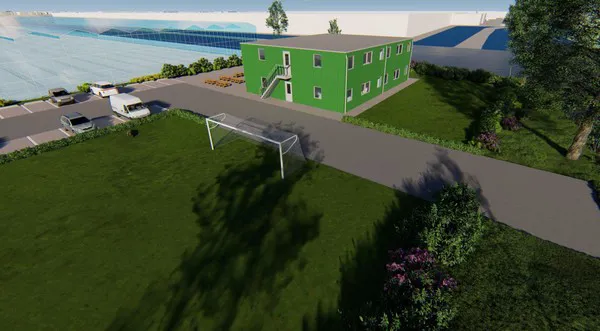At pepper grower Jansen Paprika in Andijk, things went 'fast', the zoning plan did not have to be changed and so there will soon be modular housing units next to the greenhouse. The same thing is going to happen at tulip grower Scheperswijk in nearby Hem, but here it took three years before the go ahead was given.
It is typical of the way in which people in the Netherlands are currently struggling with the housing of migrant workers, according to Marc Govers of Blueblox. He helps the above-mentioned growers with modular housing for their personnel, as he does for more and more growers.
The growers always take the initiative, but instead of being applauded for solving a problem, they run into a lot of opposition. "I occasionally sit at the table with municipalities, but I only know a handful where things are arranged somewhat reasonably," Marc says. "In the vast majority of cases, they don't seem to understand how it works."

Marc, pictured here wearing a construction helmet, works in the greenhouse, on the building site and in the town hall to help growers find accommodation.
Defining
It is clear by now that there is a problem with migrant labour. Growers are finding it increasingly difficult to find personnel and are now even competing among themselves to get enough 'hands'. Meanwhile, there is no housing for migrant workers. As a result, stories about exploitation of migrant workers still come out with depressing regularity. "If you sometimes see and hear about the miserable conditions they currently live in... It is my mission to do something about it," Marc says. After which he hastens to say that "of course (he) can't build everything."
Now, of course, no one is forcing him to. Growers themselves are also keen. They have noticed that in the struggle for sufficient good staff, it helps to stand out by offering good accommodation. "Migrant workers currently have their pick of growers. They naturally prefer to choose good housing."

An example of how the modular housing units offered by Blueblox are placed.
Misunderstanding
Blueblox offers modular residential units for that purpose, which the grower can place on his own property. Not luxury villas, but an excellent solution for the migrant workers, who often stay for only a short time. "If you take a glance at the units, it isn't immediately obvious that they are quick to build and easy to move. They have concrete floors, good kitchens, bathrooms and bedrooms."

And not just single rooms. "That's a big misunderstanding among policymakers and others. They look at this issue too much from their own perspective. Why shouldn't Polish or Romanian couples be allowed to sleep together in one room?"

Realism
Marc cites the example of the bedrooms because, in his opinion, it shows how plans often get stuck. "The requirements for housing are too extreme. Of course everything has to be neat and tidy, but if that means endless discussions without anything being built... Then we won't make any progress at all."
"Everyone also wants a swimming pool in their garden, but we can't all afford that either. So let's be realistic. 25% of the salary that a migrant worker receives may go towards housing. Often the minimum wage, because we are not prepared to pay more for our vegetables, fruit, flowers and plants. Say it's about 95 euros a week. You can't build villas for that."

Sketch of the housing at Jansen Paprika
Fear
Local authorities are often not in favour of growers building housing on their own property. And yet growers often have the space. "I know plenty of growers who have land on which they could build, but whose main obstacle is the municipality. Sometimes because it would interfere with the development of glasshouse areas, sometimes out of fear of abuse.
They then point out 'the importance of the migrant worker' who has live close to the facilities and not be too dependent on the employer, Marc sees. "But migrant workers work six days a week and do much less shopping. So what could be more practical? And they don't need to travel to work. That saves on logistics costs.
And the exploitation? "That is a fear, while in my opinion you should always assume that something could go well instead of poorly. That's why I always write management plans for clients, in which all possible bottlenecks are described in advance and solutions are also provided."

Press on
Despite all the obstacles, more and more growers are starting to install modular housing units. "The labour problem will only increase, as will the general housing shortage in the Netherlands," Marc predicts, before ending on a positive note. "Growers who persevere now will reap the rewards. In doing so, they will also be helping their colleagues, by showing them that it is possible. Especially in good cooperation with the municipality, like at Jansen Paprika, where they understand how it should be done. And the rest of the Netherlands benefits as well, because houses become available for others when migrant workers don't have to live in them anymore."
For more information:
Marc Govers 
BlueBlox
+31 (0)164 741 644
marc@blueblox.nl
www.blueblox.nl
